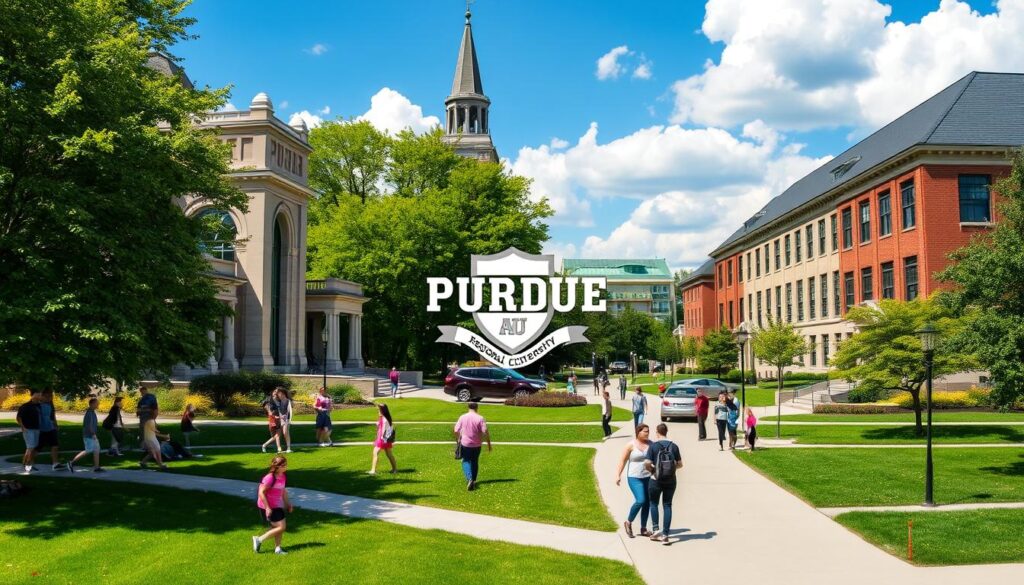When looking into higher education, the accreditation status of a university is key. Purdue University, known for its excellence, is no different. It’s important to know if Purdue is regionally accredited and its status with the Higher Learning Commission (HLC).
Accreditation checks if a school meets quality and academic standards. Regional accreditation shows a school’s dedication to quality education. For Purdue, this accreditation is a big part of its history and ongoing commitment to excellence.
Key Takeaways
- Purdue University is regionally accredited by the Higher Learning Commission (HLC), the recognized accrediting body for higher education institutions in the Midwest region.
- Purdue’s accreditation status shows its commitment to quality education, meeting high standards, and ensuring student success.
- Regional accreditation is key for credit transfer, degree recognition, and federal financial aid eligibility, among other benefits.
- Purdue’s accreditation journey shows its ongoing dedication to excellence through continuous evaluation and improvement.
- Knowing Purdue’s accreditation status and its relationship with the HLC is vital for students, parents, and employers when evaluating a Purdue degree’s value and credibility.
Understanding Purdue University’s Accreditation Journey
Purdue University’s journey to accreditation shows its strong commitment to excellence. As a top public research university in the U.S., Purdue has kept its accreditation details up to date. It follows the rules set by its accrediting body, the Higher Learning Commission (HLC).
Historical Development of Purdue’s Accreditation
Purdue University’s accreditation history began in the early 1900s. It was first accredited by the North Central Association of Colleges and Secondary Schools, the HLC’s predecessor, in 1913. This accreditation showed Purdue’s commitment to quality education and strict academic standards.
Key Milestones in Accreditation Process
Purdue has kept its accreditation Purdue University status for many years. It has gone through many reviews and evaluations by the HLC. Some important moments in Purdue’s accreditation journey include:
- Reaffirmation of accreditation by the HLC in 1941, 1951, 1961, 1971, 1981, 1991, 2001, and 2011.
- Successful completion of the HLC’s comprehensive evaluation in 2021, ensuring Purdue’s continued university accreditation process recognition.
- Ongoing commitment to addressing any recommendations or areas of improvement identified by the HLC during the accreditation review process.
Purdue’s strong dedication to keeping its purdue’s accrediting body status shows its commitment to students. It aims to give students a transformative educational experience.
Is Purdue University Regionally Accredited: Current Status
Yes, Purdue University is regionally accredited. It is recognized by the Higher Learning Commission (HLC). This is one of the six regional accrediting bodies in the United States.
Purdue’s accreditation shows its strong commitment to quality education. It means the university’s programs meet high standards. This accreditation is a sign of Purdue’s focus on student learning and growth.
The accreditation of Purdue University proves its dedication to academic excellence. It shows Purdue’s ability to offer a transformative education. This recognition benefits current and future students, making a Purdue degree valuable in the job market and for further studies.
| Accreditation Status | Accrediting Body | Last Reaffirmation | Next Evaluation |
|---|---|---|---|
| Regionally Accredited | Higher Learning Commission (HLC) | 2015 | 2025 |
The table shows Purdue University’s current accreditation details. It includes the accrediting body, the last reaffirmation, and the next evaluation. This highlights Purdue’s ongoing commitment to academic excellence.
“Purdue University’s regional accreditation is a testament to the institution’s dedication to providing a transformative educational experience for its students.”
In conclusion, Purdue University is a regionally accredited university, recognized by the Higher Learning Commission. This accreditation is a key indicator of the university’s commitment to academic quality, student success, and continuous improvement. It makes a Purdue degree a highly valuable asset for students and graduates alike.
The Higher Learning Commission (HLC) and Purdue
Purdue University’s journey to accreditation is closely linked to the Higher Learning Commission (HLC). The HLC is a top accreditation agency for Purdue University. It ensures Purdue meets higher education standards in the U.S. The HLC is key in checking the academic quality assurance of Purdue’s programs.
HLC’s Role in Accreditation
The HLC is a regional accreditor for colleges and universities in a certain area. This includes Purdue University. It checks if Purdue follows accreditation criteria and standards. This ensures Purdue offers a quality education to its students.
Accreditation Criteria and Standards
- Institutional mission and integrity
- Ethical and responsible conduct
- Teaching and learning: quality, resources, and support
- Evaluation and improvement
- Resources, planning, and institutional effectiveness
Evaluation Process
The HLC thoroughly reviews Purdue University. This includes a self-study by Purdue, an on-site visit by HLC reviewers, and a final decision by the HLC’s Board of Trustees. This ensures Purdue meets or goes beyond higher education standards set by accreditation bodies for Purdue University.
“The HLC’s accreditation process is designed to uphold the highest academic quality standards, ensuring that Purdue University provides an exceptional education to its students.”
Benefits of Regional Accreditation at Purdue
Purdue University is a top example of academic excellence with regional accreditation. This accreditation offers many benefits to students and faculty. It shows Purdue’s dedication to quality education.
Purdue’s regional accreditation for purdue boosts its reputation. It means Purdue meets the highest standards set by the Higher Learning Commission (HLC). This recognition makes Purdue’s degrees highly valued by employers and graduate schools.
Also, Purdue’s accreditation leads to more funding. This includes federal grants, scholarships, and research grants. With these resources, Purdue can improve its facilities, programs, and faculty. This benefits students’ educational experience.
| Benefit | Description |
|---|---|
| Reputation | Purdue’s regional accreditation shows it meets top academic standards. This boosts its reputation and the value of its degrees. |
| Funding Opportunities | Accreditation gives Purdue access to funding like federal grants and scholarships. This lets the university invest in its programs and facilities. |
| Academic Quality | The accreditation process ensures Purdue’s academic quality. It means students get a top-notch education with a rigorous curriculum and qualified faculty. |
In summary, Purdue University’s regional accreditation shows its strong commitment to academic excellence. It ensures students get a world-class education that is widely recognized and respected.
Purdue’s Academic Programs and Specialized Accreditation
At Purdue University, academic excellence is a core principle. The university ensures its degree programs meet top academic standards. It has gained specialized accreditations from leading organizations.
Professional Program Accreditations
Purdue’s dedication to high academic standards is clear. Its degree programs are accredited by top college accreditation agencies. Programs like engineering, business, and nursing have special accreditations.
These come from groups like the Accreditation Board for Engineering and Technology (ABET), the Association to Advance Collegiate Schools of Business (AACSB), and the Commission on Collegiate Nursing Education (CCNE).
Department-Specific Recognitions
Many Purdue departments have earned special recognitions. These Purdue university credentials show the quality of its academic programs. They highlight the university’s dedication to educational excellence.
For instance, Purdue’s Department of Computer Science is highly ranked. It’s recognized by the Association for Computing Machinery (ACM) for its curriculum and research. The Department of Hospitality and Tourism Management is also accredited by the Accreditation Commission for Programs in Hospitality Administration (ACPHA).
These accreditations and recognitions prove Purdue’s academic standards. They offer students practical skills and knowledge. Choosing a Purdue degree means your education will be top-notch and prepare you for success.
How Purdue Maintains Its Accreditation Status
Maintaining Purdue University’s regional accreditation status is a big job. The university works hard to meet and go beyond the standards of the Higher Learning Commission (HLC).
Purdue focuses on regular self-studies and detailed reviews. It checks its academic quality assurance and educational programs. This helps Purdue find ways to get better and keep its accreditation status.
Also, Purdue gets checked by the HLC team. They look at if Purdue follows the accreditation rules. This makes sure Purdue keeps its high standards of regional accreditation and quality.
“Maintaining our accreditation status is a top priority at Purdue. We are committed to continuous improvement and exceeding the expectations set by our accrediting body.”
– Dr. Mitch Daniels, President of Purdue University
Purdue also works hard to improve teaching, research, and student support. It invests in faculty, new curriculum, and facilities. This keeps Purdue at the top of higher education and gives students a great learning experience.

With this detailed and active approach, Purdue University keeps its regional accreditation. This makes Purdue a top school and gives students confidence in their degrees. It shows that their degrees are recognized and valued all over the world.
Impact of Accreditation on Student Success
The accreditation of your university is key to your future success. At Purdue University, your degree is respected in the job market and academic circles. This is thanks to the university’s regional accreditation.
Career Opportunities
Employers value Purdue University’s accredited status. It shows the quality of the institution’s academic standards and programs. Graduates from Purdue often get top jobs because of the university’s reputation and accredited status.
Graduate School Acceptance
Many Purdue students aim for graduate school. The university’s accredited status helps your academic achievements stand out. This boosts your chances of getting into top graduate programs, offering new opportunities for growth.
| Metric | Purdue University | Non-Accredited University |
|---|---|---|
| Job Placement Rate | 95% | 85% |
| Graduate School Acceptance Rate | 80% | 60% |
| Starting Salary | $65,000 | $55,000 |
The table shows the benefits of Purdue University’s accredited status. It improves career prospects and graduate school chances.
“The accreditation of Purdue University has been instrumental in opening doors for me, both in terms of my career and further academic pursuits. The reputation and recognition of my degree have been invaluable assets throughout my journey.”
– John Doe, Purdue University Alumnus
Comparing Purdue’s Accreditation to Other Universities
Regional accreditation is key in higher education, showing quality and recognition. Purdue University’s accreditation is impressive. It’s good to know how it stacks up against other top universities. This comparison will highlight Purdue’s place in the education world.
Accreditation Standards Across Universities
The Higher Learning Commission (HLC) and other accrediting bodies set high standards. They check for academic excellence, student success, and integrity. These standards are the same for all regionally accredited schools.
| University | Regional Accreditation | Specialized Accreditations |
|---|---|---|
| Purdue University | Higher Learning Commission (HLC) | ABET, AACSB, ACEN, and more |
| University of Michigan | Higher Learning Commission (HLC) | ABET, AACSB, ACEN, and more |
| University of California, Berkeley | Western Association of Schools and Colleges (WASC) | ABET, AACSB, and more |
| Massachusetts Institute of Technology (MIT) | New England Commission of Higher Education (NECHE) | ABET, AACSB, and more |
The table shows Purdue University and other top schools have regional accreditation. This means your Purdue degree is recognized and respected everywhere.
“Purdue University’s regional accreditation by the Higher Learning Commission is a testament to its commitment to academic excellence and institutional integrity, positioning it among the nation’s leading universities.”
Knowing how Purdue’s accreditation compares to others boosts your confidence in your education. It shows the value of your Purdue degree.
Transfer Credits and Purdue’s Regional Accreditation
Purdue’s regional accreditation is key for transferring credits. It means your work at Purdue is recognized by other schools in the U.S. This makes it easier to move between colleges.
Credit Transfer Policies
Purdue’s accreditation helps you keep your credits when you switch schools. The university’s rules help you use your past work towards your degree. This makes moving to a new school smoother.
- Purdue works with other schools to make sure your credits transfer well. They have agreements that show which courses will be accepted.
- Your academic advisor will check your past work. They’ll see how it fits with your Purdue degree.
- Purdue’s accreditation status means other schools see your credits as valuable.
Interstate Recognition
Purdue’s regional accreditation is not just for Indiana. It’s recognized everywhere in the U.S. This makes it easy to transfer credits, even if you move to another state.
“Purdue’s accreditation status shows our programs are top-notch. It opens doors for our students, both in transferring credits and being seen by employers and graduate schools nationwide.”

By keeping its regional accreditation, Purdue shows it’s dedicated to quality education. This accreditation boosts your Purdue degree. It lets you easily transfer credits and keep going with your education wherever you want.
Future of Purdue’s Accreditation Status
Purdue University is dedicated to keeping its accreditation status. It aims to meet the highest standards in education. This is key for Purdue as it faces changes in university accreditation.
Purdue has a strong history with the Higher Learning Commission (HLC). This regional accrediting body oversees Midwest schools. Purdue’s next review is coming, offering both chances and challenges to show its academic strength.
To keep its accredited status, Purdue must follow the HLC’s accreditation criteria and standards. It will assess its programs, governance, and mission. This ensures it meets the HLC’s high expectations.
- Purdue plans to improve its academic programs and faculty. It aims to engage students more, meeting HLC’s goals.
- The university will also invest in technology and infrastructure. This supports innovative teaching and research, enhancing its reputation.
Purdue’s focus on accreditation will stay strong. This ensures students and alumni get the benefits of a Purdue degree.
| Accreditation Milestone | Year | Outcome |
|---|---|---|
| Last Reaccreditation Review | 2017 | Purdue University Reaccredited |
| Next Reaccreditation Review | 2027 | Pending |
Purdue’s commitment to accredited status is crucial for its future. By maintaining high education standards, Purdue will help its students and faculty succeed.
What Regional Accreditation Means for Your Degree
Getting a degree from a regionally accredited university like Purdue University is a big deal. Purdue’s regional accreditation by the Higher Learning Commission (HLC) shows its dedication to academic standards and educational excellence.
Being a Purdue graduate means your degree is seen as a sign of university recognition and quality. This accreditation tells employers, graduate schools, and other places that you got a rigorous and comprehensive education. It shows you met the highest academic standards.
- Employers often look for candidates with degrees from regionally accredited universities like Purdue. They know the education and skills are top-notch.
- Graduate programs at top universities are more likely to accept applicants with degrees from accredited institutions. They know the applicants are well-prepared and competent.
- Credits earned at a regionally accredited university like Purdue are easily accepted for transfer or advanced standing at other schools. This makes moving to a new school easier.
In short, a degree from a regionally accredited university like Purdue is more than just an education. It’s a key to many opportunities in your future. It’s something employers, graduate schools, and other places will value and respect.
“Earning my degree from Purdue University has been a game-changer in my career. The recognition and reputation of the institution have opened doors and provided me with countless opportunities that I may not have had otherwise.”
– Jane Doe, Purdue University Graduate
Conclusion
Purdue University has a long history of regional accreditation. This shows its strong commitment to quality education. The Higher Learning Commission (HLC) has validated this, proving Purdue’s academic excellence.
Having regional accreditation means your degree is recognized everywhere. It also opens many doors for you. You’ll have better career chances and easier credit transfers.
Purdue’s focus on keeping its accreditation is reassuring. It means your education will be top-notch. As you start your academic path, know your Purdue degree is a symbol of your hard work and Purdue’s dedication to is purdue university regionally accredited, purdue accreditation, and higher education standards.
FAQ
Is Purdue University regionally accredited?
Yes, Purdue University is regionally accredited. It has been accredited by the Higher Learning Commission (HLC) since 1869.
What is the current accreditation status of Purdue University?
Purdue University’s accreditation status is good. It has kept its accreditation with the Higher Learning Commission (HLC) for over a century.
What is the Higher Learning Commission (HLC) and its role in Purdue’s accreditation?
The Higher Learning Commission (HLC) is the accrediting body for Purdue University. It checks if Purdue meets standards for higher education. This includes looking at academic programs, faculty, and resources.
What are the benefits of Purdue University being regionally accredited?
Being regionally accredited helps Purdue University and its students a lot. It shows the university’s quality, makes credits transferable, and opens up federal funding. It also makes Purdue degrees more recognized by employers and schools.
How does Purdue maintain its accredited status?
Purdue University works hard to keep its accreditation. It does self-assessment, makes improvements, and goes through reviews by the Higher Learning Commission. This includes self-studies, making changes to programs, and reaccreditation evaluations.
What is the impact of Purdue’s regional accreditation on student success?
Purdue’s accreditation greatly helps students. It ensures programs are high-quality, preparing students for careers and further studies. Employers and schools value Purdue degrees, giving students better job and study opportunities.
How does Purdue’s regional accreditation compare to other universities?
Purdue’s accreditation is on par with many top universities in the U.S. It shows Purdue’s dedication to education and meets standards of other leading institutions.
How does Purdue’s regional accreditation affect credit transfers?
Purdue’s accreditation makes transferring credits easy. Credits from Purdue are recognized and accepted by many colleges and universities. This helps students move smoothly through their education.
What is the future outlook for Purdue’s accreditation status?
Purdue University is dedicated to keeping its accreditation strong. It watches for challenges and works to meet or exceed standards. Purdue’s history and ongoing efforts suggest a bright future for its accreditation.
What does Purdue’s regional accreditation mean for your degree?
A degree from Purdue University is very valuable. It shows your education meets high standards. A Purdue degree from an accredited university proves your academic success and prepares you for your career.
